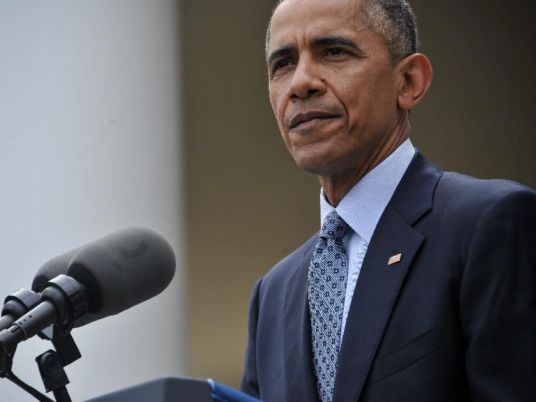New York–During the last three days, Egyptian intellectuals and American academics met at New York’s City University to discuss the currently ambiguous future of Egypt. They debated issues of regime repression, especially this month’s extension of the Emergency Law. More importantly, they questioned whether to accept external pressure, namely US interference, in the process of democratic reform in Egypt.
The main organizer of the conference was the Alliance of Egyptian Americans (AEA). It invited many prominent figures from different Egyptian political parties and movements, who came to the US especially for the event, to discuss the issue. The presence of a younger generation of Egyptians living in the US among the audience, particularly members of the Egyptian Association for Change-USA, and their profound disagreement with some statements made by the older generation of speakers furthered the controversy.
After receptions, dinners and pleasantries, the most important sessions of the conference took place on Saturday. Eminent Egyptian speakers in these sessions were Hassan Nafaa, professor of political science and coordinator of ElBaradei’s National Association for Change; Yahya al-Jamal, legal and constitutional expert; and Osama al-Ghazali Harb, founder of the Democratic Front Party.
The sessions covered different critical topics, including the current constitutional crisis and the culture and modernization of Egyptian society. They started with al-Jamal’s extraordinary summary of the history of the Egyptian constitution. This history was much needed to place current demands made by ElBaradei to amend the constitution in the proper context. Afterwards, Nafaa provided elaborate insight into upcoming elections, while Harb analyzed the characteristics of the Egyptian authoritarian regime after 1952.
Nafaa affirmed that, despite anticipated fraud in the coming parliamentary elections, not all opposition parties would decide to boycott them. “Some of the official political parties will continue to conclude deals with the government as they used to do,” Nafaa predicted.
The government seeks to get rid of the Muslim Brotherhood’s MPs. Thus, in this year’s assembly elections, the regime might replace them with members of the official political parties. Through such alliances, these parties would find a good chance to gain a few more seats, which wouldn’t change their limited representation in the parliament anyway. That is what they have done over the last three decades.
As for Harb, he focused on the last five years of Egyptian political history, focusing on the limitations on freedom of media and expression in Egypt. More importantly, he insisted that external pressure on the regime after 9/11 played a major role in enhancing the margin of freedom in the country, as was evident by the state’s establishment of the National Council for Human rights and the National Council for Women.
“I personally welcome any American pressure on the regime because it had a positive effect on the Egyptian people over the last five years,” Harb opined.
During the last two decades, the most notable means of exerting such pressure has been through extending millions of dollars in funding to human rights organizations in Egypt. They also involved inviting young activists, such as bloggers and members of the 6 April youth movement, to receive training at Washington, DC think tanks, particularly Freedom House.
Harb’s statement came as a shock to the younger people in the conference room. Tension immediately rose. Many of them, who were also members of the Egyptian Association for Change-USA, disagreed.
The air in the room was even more heated with the presence of Saad Eddin Ibrahim. Ibrahim’s Ibn Khaldun Center is one of the largest recipients of such funding and a longtime advocate of US intervention in Egypt’s democratization process. Ibrahim was not officially invited to the conference, as AEA President Mahmud al-Shadhili affirmed, due to his close ties with the US administration. Nonetheless, he insisted on showing up.
Young people in the room were constantly “tweeting” and “Facebooking” each other to exchange their reactions to the ongoing debate. One of them posted Harb’s statement on his Facebook page, and immediately received angry responses from other young Egyptians living the US.
“I disagree. What did it [external pressure] do? Was the dictator removed? The answer is NO! International pressure is only a matter of cosmetics on the face of the pressuring country, nothing more,” one female commentator noted. “As a matter of fact, this old generation of Egyptian intellectuals like Osama failed to deliver anything to us and is still advocating stupid solutions that certainly did not work in the past. It is time for us as a new generation to forge our own solutions.”
The activism of young Egyptians in the US has grown so rapidly in the last few months that it is becoming an unprecedented political phenomenon of its own. These young people previously abstained from attending what seemed to them as “elite events”–such as this conference–but now their energetic spirit can be felt both inside and outside Egypt. The majority of these young forces have never been involved in politics before, but they have suddenly surfaced with ElBaradei’s fresh thrust of hope.
“Change should be one hundred percent Egyptian. International pressure comes with baggage and expectations. If we want to build the foundations of a longlasting democracy, we have to do it ourselves,” Ahmed Raslan, a young Egyptian surgeon living in Portland, Oregon argued on Facebook as Harb was speaking.
It is worth mentioning that the Kifaya movement’s Georg Ishaq was among the invited speakers. He is also heading to Washington, DC on 19 May to speak to the Egyptian community there. Beth Baron and Joseph Massad were among the American scholars who gave scholarly analytical presentations on Egyptian political affairs.
As the conference winds up its activities today, the Egyptian intellectuals and opposition figures will soon head back to Cairo. It is unclear, however, how the Egyptian regime will receive them.

